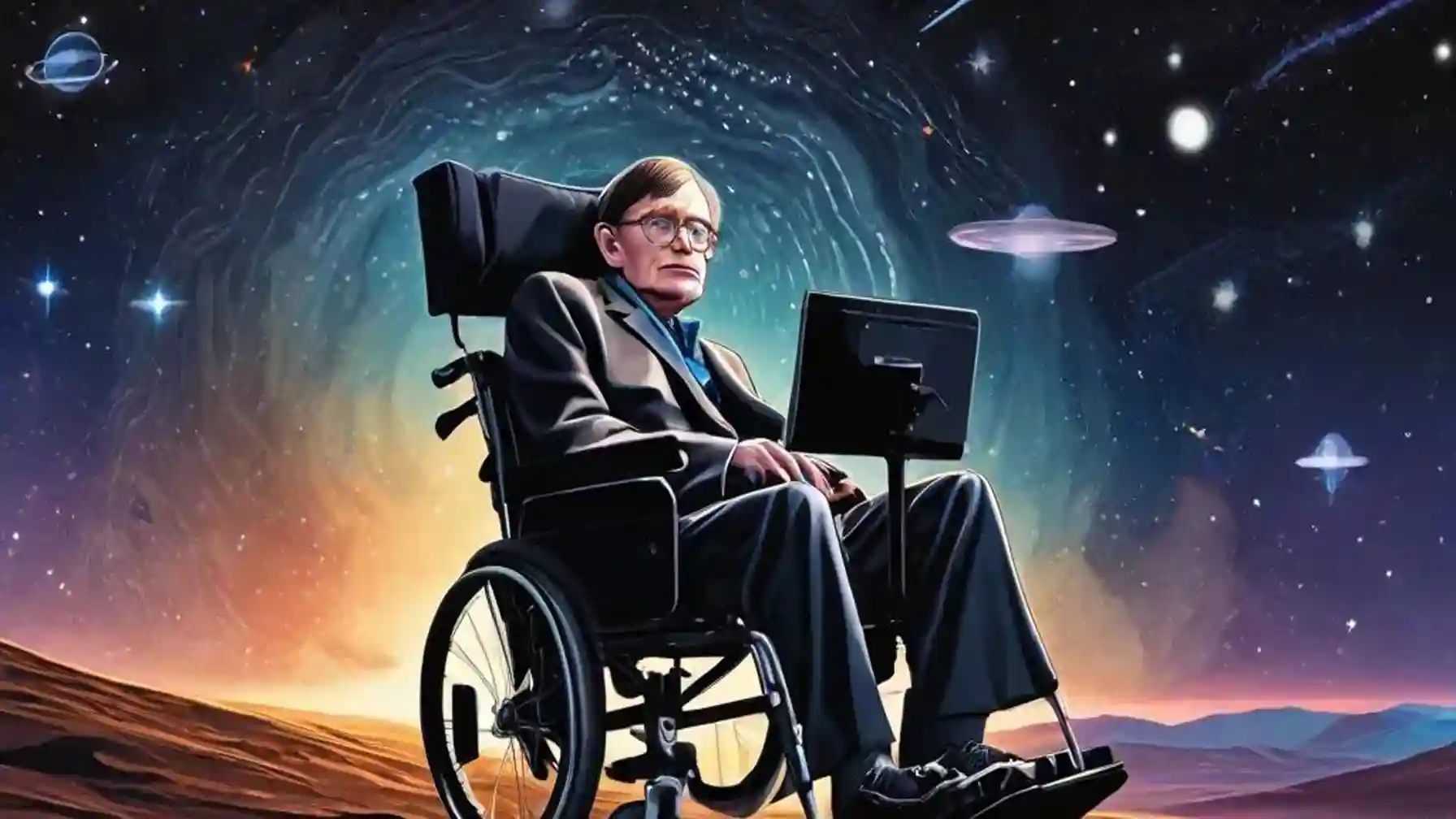Step into the captivating world of physics with Stephen Hawking and his groundbreaking book, “A Brief History of Time.” This iconic work serves as a gateway to understanding the universe’s mysteries, unraveling the complexities of black holes and the mind-bending principles of quantum mechanics.
Our exploration delves into Hawking’s life, his revolutionary theories that challenged established beliefs, and the controversies that sparked debate within the scientific community. We’ll explore his relentless pursuit of the elusive “Theory of Everything,” a unified framework to explain all physical phenomena.
Join us on this captivating journey as we unveil the brilliance of Stephen Hawking. We’ll witness his defiance against ALS, the groundbreaking work that redefined our understanding of the cosmos, and his remarkable ability to translate complex science into a captivating story for a wider audience.
Prepare to be inspired by Stephen Hawking’s legacy, a testament to human curiosity and the power of scientific exploration.
A Brief History of Time: Stephen Hawking’s Theories Demystified
Stephen Hawking’s brilliance shone through his groundbreaking theories that tackled some of the universe’s most perplexing mysteries. Stephen Hawking’s work left an unforgettable impact on physics, from the bizarre realm of black holes to the mind-bending principles of quantum mechanics. One of his most sought-after goals was achieving the “Theory of Everything,” a unified framework meant to explain all fundamental forces and particles governing the universe. His contributions challenged traditional views and inspired new avenues of research in theoretical physics.
Also Read: Space Tourism: Bridging the Gap Between Imagination and Reality
Hawking’s exploration of black holes led to his revolutionary concept known as Hawking radiation. This theory challenged established beliefs. It proposed that black holes, instead of being celestial one-way trips for matter, could emit radiation. This radiation causes them to slowly evaporate over time. Hawking radiation has opened up new avenues for research in theoretical physics. It remains a subject of intense scientific study, challenging established beliefs about black holes. This phenomenon continues to intrigue physicists worldwide.
Despite the inherent complexity of his theories, Stephen Hawking’s work has had a profound and lasting impact on modern physics. His unwavering dedication to science remains a source of inspiration. Diagnosed with ALS at a young age, Stephen Hawking continued to push boundaries in our understanding of the universe. Through his work, he not only expanded knowledge but also sparked curiosity about its intricate workings.
The Life of Stephen Hawking: Insights from A Brief History of Time:
Stephen Hawking, a renowned physicist, was born in 1942 in Oxford, England. Despite being diagnosed with ALS at the age of 21, he pursued his passion for science relentlessly.
Hawking’s educational journey took him to University College, Oxford and later to Cambridge University where he delved into theoretical physics. Overcoming physical limitations, he made groundbreaking contributions to cosmology.
His career milestones include the development of Hawking radiation theory and his work on black holes. These discoveries challenged existing paradigms in physics and sparked new avenues of research.
Facing personal and professional challenges due to his health condition, Hawking remained undeterred in advancing scientific knowledge. His legacy extends beyond academia into popular culture through books like “A Brief History of Time” which brought complex scientific concepts to a wider audience.
The impact of Stephen Hawking’s life continues to inspire scientists around the world as they strive towards unraveling the mysteries of the universe.
A Brief History of Time: Early Life and Education
Stephen Hawking was born on January 8, 1942, in Oxford, England. He grew up in a family of academics; his father was a research biologist and his mother studied philosophy. Despite showing early signs of brilliance, he wasn’t particularly diligent in school.
Hawking attended University College, Oxford where he pursued physics before moving to Cambridge for his graduate studies. It was during this time that he started noticing the first signs of ALS (amyotrophic lateral sclerosis), which would eventually paralyze him completely.
Despite the challenges posed by his deteriorating health condition, Hawking completed his Ph.D at Cambridge and went on to make groundbreaking contributions to theoretical physics. His early life laid the foundation for a remarkable journey into the depths of the universe’s mysteries.
Career milestones
Stephen Hawking’s career was defined by significant milestones that cemented his status as one of the most brilliant scientific minds today. He began with pioneering research on black holes and later advanced groundbreaking theories in quantum mechanics, constantly pushing the boundaries of our universe’s comprehension.
One of his significant career achievements was being appointed as Lucasian Professor of Mathematics at the University of Cambridge, a position once held by Sir Isaac Newton. This prestigious role provided him with a platform to further develop and share his revolutionary ideas with the world.
Hawking’s publication of “A Brief History of Time” in 1988 became an international bestseller, making complex scientific concepts accessible to a wider audience. This book catapulted him into global fame and cemented his legacy as a science communicator par excellence.
Personal and professional challenges
Stephen Hawking faced numerous personal and professional challenges throughout his life, showcasing remarkable resilience and determination. Diagnosed with a rare form of motor neuron disease at the young age of 21, he defied all odds by continuing to pursue his passion for theoretical physics despite being given only a few years to live.
Navigating physical limitations that gradually confined him to a wheelchair and eventually robbed him of speech, Hawking relied on innovative communication technology to communicate his groundbreaking ideas to the world. His perseverance in the face of immense physical challenges serves as an inspiration not only within the scientific community but also to individuals facing adversities worldwide.
Despite his physical constraints, Stephen Hawking’s intellectual contributions continued to shape modern cosmology and quantum theory. He transcended barriers through sheer intellect, proving that one’s potential is limitless when driven by curiosity and unwavering dedication.
Legacy and impact
Stephen Hawking’s legacy and impact in the scientific community are profound. His groundbreaking theories on black holes, quantum mechanics, and the universe have left an indelible mark on modern physics.
Hawking’s ability to communicate complex scientific concepts to a wider audience has inspired countless individuals to pursue careers in science and explore the mysteries of the cosmos. His iconic book “A Brief History of Time” has become a cornerstone of popular science literature.
Beyond his scientific contributions, Hawking’s resilience in the face of debilitating illness serves as a testament to human determination and spirit. Despite being diagnosed with ALS at a young age, he continued to push boundaries and challenge conventional thinking.
The influence of Stephen Hawking extends far beyond his academic achievements; he remains a symbol of curiosity, intellect, and perseverance for generations to come.
A Brief History of Time: Hawking’s Key Scientific Contributions:
Stephen Hawking’s key scientific contributions have revolutionized our understanding of the universe. His work on black holes and quantum mechanics has left an indelible mark on the field of astrophysics.
Hawking is renowned for his groundbreaking Theory of Everything, a quest to unify all fundamental forces in physics into one comprehensive framework. This ambitious theory continues to inspire researchers worldwide.
One of his most significant discoveries is Hawking radiation, which proposes that black holes emit particles and eventually evaporate over time. This concept challenged established notions about black hole behavior and sparked new avenues of research.
Hawking’s legacy in modern physics extends beyond his theories; he inspired generations with his innovative thinking and determination to unravel the mysteries of the cosmos. His contributions continue to shape scientific discourse and influence ongoing research efforts globally.

A Brief History of Time: Exploring from Black Holes to Quantum Mechanics
Stephen Hawking’s exploration from black holes to quantum mechanics revolutionized our understanding of the universe. His groundbreaking work on black holes showed how these mysterious entities are not just cosmic vacuums but actually emit radiation, now known as Hawking radiation. This discovery challenged long-standing assumptions in physics and opened up new avenues for research.
Hawking’s integration of quantum mechanics with general relativity led to his quest for a “theory of everything,” seeking to unify the fundamental forces of nature into one cohesive framework. This pursuit pushed the boundaries of scientific inquiry and inspired generations of physicists.
By bridging the gap between macroscopic phenomena like black holes and microscopic particles governed by quantum laws, Hawking reshaped our perception of reality at both cosmic and subatomic scales. His work continues to influence cutting-edge research in theoretical physics, leaving an indelible mark on the field for years to come.
Theory of everything
Stephen Hawking’s quest for a “Theory of Everything” aimed to unify the fundamental forces of the universe into one comprehensive framework. This ambitious theory seeks to explain all physical phenomena, from the smallest particles to the vast cosmos, under a single set of principles.
In his pursuit of this grand unification theory, Hawking delved into the realms of quantum mechanics and general relativity, grappling with complex mathematical equations and profound philosophical implications. His work in this area challenged traditional scientific boundaries and pushed the frontiers of human understanding.
The concept of a Theory of Everything has captivated scientists and enthusiasts alike, offering tantalizing prospects for unlocking the mysteries of existence itself. While still an elusive goal, Hawking’s contributions have paved the way for continued exploration and innovation in theoretical physics.
By striving towards a unified description of nature’s laws, Stephen Hawking exemplified the relentless curiosity and boundless imagination that drive scientific discovery forward.
Hawking radiation
Stephen Hawking’s groundbreaking theory of Hawking radiation revolutionized our understanding of black holes. This phenomenon proposes that black holes are not entirely “black” but actually emit radiation due to quantum effects near the event horizon.
In simpler terms, pairs of particles and antiparticles are constantly being created and annihilated near the edge of a black hole. When this occurs at the event horizon, one particle can fall into the black hole while its partner escapes as radiation.
This process causes a gradual loss of mass for the black hole over time until it ultimately evaporates completely. Hawking radiation has profound implications for both quantum mechanics and general relativity, challenging traditional views on how information is preserved in these extreme environments.
Also Read: Survival of the Fittest: How Evolution Shapes the Natural World
The concept of Hawking radiation has sparked intense debate among physicists and continues to be an area of active research in theoretical physics today.
A Brief History of Time: Its Legacy in Modern Physics
Stephen Hawking’s legacy in modern physics is profound and far-reaching. His groundbreaking work on black holes and quantum mechanics has revolutionized our understanding of the universe. By bridging the gap between general relativity and quantum theory, Hawking paved the way for new avenues of research in theoretical physics.
His contributions to the concept of a “theory of everything” continue to inspire physicists to seek a unified framework that explains all fundamental forces in nature. The idea that one single equation could encompass the laws governing our entire universe remains a tantalizing prospect within the scientific community.
Hawking radiation, his hypothesis that black holes emit particles and eventually evaporate, challenged established beliefs about these enigmatic cosmic entities. This concept has sparked ongoing debates and investigations into the behavior of black holes.
In today’s world of physics, Stephen Hawking’s legacy serves as a guiding light for aspiring scientists seeking to unravel the mysteries of space, time, and beyond.
Controversies in A Brief History of Time: Stephen Hawking’s Bold Ideas
Stephen Hawking was not one to shy away from controversy. His outspoken nature and radical ideas often stirred up debates within the scientific community and beyond. One of the most notable controversies surrounded his views on the existence of God, where he famously stated that science makes a creator unnecessary.
Hawking also challenged established scientific theories, including his skepticism towards the concept of an infinite universe. He proposed that black holes might not be eternal prisons for matter but rather could leak information and eventually disappear, contradicting previous beliefs in physics.
Despite facing criticism for some of his unconventional viewpoints, Hawking’s impact on the scientific community cannot be denied. His willingness to push boundaries and question existing norms has inspired a new generation of thinkers to explore beyond conventional wisdom and delve into the unknown realms of theoretical physics.
Controversial statements and philosophical views
Stephen Hawking was not only known for his groundbreaking scientific theories but also for his controversial statements and philosophical views that stirred debates within the scientific community.
One of the most contentious topics he delved into was the nature of black holes and their potential to violate established principles in physics. Hawking’s proposition that information could be lost in a black hole contradicted the fundamental laws of quantum mechanics, leading to heated discussions among physicists.
Moreover, Hawking’s atheistic beliefs and skepticism towards religion sparked intense debates on the intersection between science and spirituality. While some admired his bold stance against supernatural explanations, others criticized him for dismissing metaphysical perspectives.
Despite facing criticism for these viewpoints, Stephen Hawking remained unapologetic about expressing his beliefs, challenging conventional norms in both science and philosophy. His willingness to confront controversy ultimately solidified his legacy as a fearless intellectual thinker.
Challenges to Established Scientific Theories in A Brief History of Time
Stephen Hawking’s groundbreaking work often challenged established scientific theories, pushing the boundaries of our understanding of the universe. His ideas on black holes and quantum mechanics revolutionized traditional concepts in physics, leading to new perspectives and insights.
By questioning conventional beliefs, Hawking paved the way for innovative approaches to complex cosmic phenomena. His willingness to explore unconventional paths inspired a generation of scientists. They were encouraged to think beyond existing limitations and explore uncharted territories in theoretical physics. This pioneering spirit continues to shape modern scientific inquiry.
Through his controversial statements and daring hypotheses, Hawking sparked debates within the scientific community. His ideas encouraged critical thinking and fostered a culture of intellectual curiosity. Despite facing skepticism from some quarters, his bold challenges to established norms enriched scientific discourse and propelled advancements in theoretical physics.
Hawking’s legacy as a pioneer resonates in contemporary research efforts. He fearlessly confronted accepted paradigms in unraveling the mysteries of the cosmos. His influence continues to inspire new generations of scientists worldwide.
Impact on the scientific community
Stephen Hawking’s impact on the scientific community is undeniable. His groundbreaking work in theoretical physics has revolutionized our understanding of the universe, inspiring countless researchers and scientists worldwide.
One of his most significant contributions was challenging established theories on black holes. His proposals introduced new ideas that reshaped the field of astrophysics and cosmology. By bridging the gap between general relativity and quantum mechanics, Hawking opened up exciting new avenues for exploration.
His ability to communicate complex scientific concepts to a broader audience also played a crucial role in popularizing science. Through his books, lectures, and media appearances, Hawking made intricate theories accessible to people from all backgrounds, sparking interest and curiosity about the mysteries of the cosmos.
Moreover, Stephen Hawking advocated for interdisciplinary collaboration. He pushed boundaries within traditional academic structures, encouraging a holistic approach to scientific inquiry. His legacy inspires future generations of researchers to think boldly and expand human knowledge.
Stephen Hawking’s Popular Works and Quotes:
Stephen Hawking’s popular works and quotes have not only enlightened the scientific community but also captivated the general public. His book “A Brief History of Time” became a bestseller, unraveling complex concepts in cosmology for a wide audience. The film “The Theory of Everything” portrayed his life story, shedding light on his brilliance and personal struggles.
Hawking’s memorable quotes resonate with people worldwide, offering profound insights into the universe and human existence. One of his famous quotes is, “The greatest enemy of knowledge is not ignorance; it is the illusion of knowledge.” This quote reflects his belief in continuous learning and challenging established beliefs.
His influence on popular culture extends beyond books and films, inspiring countless individuals to delve into the mysteries of science. Through his works and words, Stephen Hawking continues to inspire curiosity and spark intellectual discourse globally.
Books and films by Stephen Hawking
Stephen Hawking’s impact extended beyond academic papers and lectures; he also delved into popular culture through his books and films. His best-selling book, “A Brief History of Time,” made complex scientific concepts accessible to a wider audience, becoming a staple in understanding the universe. The book’s success led to documentaries like the 1991 film of the same name directed by Errol Morris, blending science with storytelling.
Hawking continued engaging audiences with books like “The Universe in a Nutshell” and “Black Holes and Baby Universes.” These works not only educated but inspired readers worldwide. Additionally, his appearances on TV shows like “The Simpsons” and “Star Trek: The Next Generation” showcased his humor and charm outside academia.
Through his literary contributions and media appearances, Stephen Hawking brought science out of the labs into living rooms globally.
Memorable quotes and insights
![]()
Stephen Hawking, known for his brilliance in theoretical physics, has left behind a treasure trove of memorable quotes and insightful thoughts that continue to inspire many. One of his famous quotes is “Intelligence is the ability to adapt to change.” This statement highlights his belief in the power of flexibility and innovation in navigating life’s challenges.
Another thought-provoking quote by Hawking is “The greatest enemy of knowledge is not ignorance, it is the illusion of knowledge.” This profound insight emphasizes the importance of humility and continuous learning in expanding one’s understanding of the world.
Hawking also famously said, “Quiet people have the loudest minds,” shedding light on the hidden depths within individuals who may not always express themselves outwardly. This quote resonates with introverts and deep thinkers who often possess rich inner worlds.
Through his words, Stephen Hawking continues to spark curiosity and contemplation among people from all walks of life. His legacy lives on through these timeless quotes that encourage us to think critically and embrace new ideas with an open mind.
Influence on popular culture
Stephen Hawking’s influence extends beyond the realm of science and into popular culture. His appearances on TV shows like “The Simpsons” and “The Big Bang Theory” introduced his genius to a wider audience, portraying him in a humorous yet respectful light.
Tbest-selling book, “A Brief History of Time,” became a cultural phenomenon, inspiring countless people to delve into the complexities of the universe. His iconic computerized voice further solidified his image in popular culture.
Hawking’s wit and humor made him a beloved figure outside scientific circles. Memorable quotes such as “Intelligence is the ability to adapt to change” resonate with audiences worldwide, transcending academic boundaries.
In movies like “The Theory of Everything,” audiences got an intimate look at Hawking’s personal struggles alongside his groundbreaking work. His legacy continues to captivate minds and hearts across various mediums even after his passing.
Ongoing Influence of A Brief History of Time: Stephen Hawking’s Legacy
Stephen Hawking’s ongoing influence continues to shape the landscape of modern physics. Even after his passing, his theories and contributions are still at the forefront of scientific research. Recent developments in areas like black hole entropy and quantum gravity have built upon his groundbreaking work, pushing the boundaries of our understanding of the universe.
Tributes and honors pour in from around the world, highlighting Hawking’s enduring impact on both science and society. His legacy lives on through various scholarships, awards, and dedicated research initiatives that carry forward his pursuit of unraveling the mysteries of the cosmos.
As scientists delve deeper into Hawking’s concepts, new insights emerge that challenge existing paradigms in physics. The ripple effect of his ideas continues to inspire a new generation of researchers to explore uncharted territories in theoretical physics and cosmology.
Stephen Hawking’s intellectual curiosity knows no bounds even today as researchers worldwide strive to build upon his foundational work. As we look towards the future, it is evident that Hawking’s influence will endure for generations to come, shaping how we perceive the universe and our place within it.
Recent developments in Hawking’s theories
Stephen Hawking’s groundbreaking theories continue to evolve with recent developments pushing the boundaries of our understanding of the universe. New research in theoretical physics and cosmology has built upon Hawking’s work, exploring concepts such as quantum gravity and the nature of spacetime.
One notable development is the ongoing exploration of black hole information paradox, a puzzle that challenges conventional ideas about information loss in black holes. Scientists are delving deeper into this enigma, drawing inspiration from Hawking’s contributions to unravel its mysteries.
Advancements in quantum mechanics have also led to further insights into the behavior of particles at a quantum level, aligning with some aspects of Hawking’s earlier proposals on quantum fluctuations near black holes. These contemporary studies are reshaping our perspective on fundamental aspects of reality.
As researchers delve into these complex areas, Stephen Hawking’s legacy remains a guiding light. It inspires those seeking to unlock the secrets of the cosmos through innovative scientific inquiry. His influence drives forward-thinking approaches in the quest for understanding.
Tributes and honors in Hawking’s memory
Stephen Hawking’s legacy continues to be honored through various tributes and recognitions in the scientific community. From academic institutions establishing scholarships and lectureships in his name to dedicated research initiatives carrying forward his work, the impact of Hawking’s contributions lives on.
Universities worldwide honor him by naming buildings, centers, and programs after his groundbreaking physics theories. The prestigious Stephen Hawking Medal for Science Communication acknowledges those adept at explaining complex scientific concepts to the public. This recognition reflects his commitment to spreading knowledge.
In addition, documentaries, exhibitions, and artistic interpretations celebrate Hawking’s life and achievements beyond academia. His influence extends far beyond scientific circles into popular culture as a symbol of intellect and curiosity that transcends physical limitations.
As we remember Stephen Hawking with admiration and respect, these tributes serve as reminders of his enduring impact on science and society.
Continuing legacy in scientific research
Stephen Hawking’s enduring legacy in scientific research continues to shape the landscape of theoretical physics. His groundbreaking work on black holes and quantum mechanics has paved the way for new discoveries and advancements in our understanding of the universe.
Researchers around the world are building upon Hawking’s theories, exploring avenues he opened up and delving deeper into complex questions about space, time, and the fundamental laws of nature. The impact of his contributions can be seen in various branches of physics, from cosmology to quantum gravity.
By pushing boundaries and challenging conventional thinking, Stephen Hawking inspired a new generation of scientists to think boldly and creatively. His influence transcends disciplines, sparking interdisciplinary collaborations that aim to unravel some of the most profound mysteries of our existence.
As we look towards the future, Hawking’s legacy serves as a guiding light for those who seek to push the boundaries of human knowledge even further. The impact he has left on scientific research will continue to inspire generations to come.
Resources and Further Reading:
Looking to delve deeper into Stephen Hawking’s groundbreaking theories? Here are some valuable resources and further reading materials to expand your knowledge and understanding.
For those interested in exploring the complexities of Hawking’s work, his bibliography is a treasure trove of scientific insights. From “A Brief History of Time” to “The Universe in a Nutshell,” these books provide a glimpse into the mind of one of the most brilliant theoretical physicists of our time.
Additionally, there are numerous articles and interviews available online that offer more detailed explanations of Hawking’s key concepts. These resources can help clarify any lingering questions you may have about black holes, quantum mechanics, or the elusive theory of everything.
For those looking to continue their exploration beyond traditional literature, documentaries and films about Stephen Hawking’s life and work provide a visual journey through his contributions to science. These visual mediums offer a unique perspective on his legacy that complements written sources.
Whether you’re an aspiring physicist, or just curious about the universe, exploring these resources will enrich your understanding of Stephen Hawking’s profound influence on modern physics. Delve into these materials to gain insights into Hawking’s enduring impact and his contributions to our understanding of the cosmos.
Bibliography and additional resources
Looking to delve deeper into Stephen Hawking’s groundbreaking theories and life story? Check out these recommended resources for a more comprehensive understanding.
Start with “A Brief History of Time,” Hawking’s seminal work that explores complex scientific concepts in an accessible way. This book provides a great introduction to his key ideas on black holes, the universe, and time.
For those interested in his personal journey, “My Brief History” offers a candid look at Hawking’s life, from his early struggles with illness to becoming one of the most renowned physicists of our time.
To explore Hawking’s impact on modern physics further, consider reading academic papers authored by him or about his theories. These scholarly articles provide detailed insights into his contributions to cosmology and quantum mechanics.
Online platforms like TED Talks and academic journals also feature interviews and discussions with Hawking, offering valuable perspectives on his work and legacy.
Links to key articles and interviews
If you’re eager to delve deeper into Stephen Hawking’s groundbreaking theories, exploring key articles and interviews is a must. These resources offer valuable insights into his scientific contributions, controversies, and personal reflections.
Articles written by renowned physicists and scholars often dissect Hawking’s work with precision, shedding light on the complexities of black holes, quantum mechanics, and the elusive theory of everything. Reading these analyses can provide a deeper understanding of Hawking’s impact on modern physics.
Interviews with Hawking himself offer a glimpse into his brilliant mind and charismatic personality. Hearing him discuss his theories in his own words adds a personal touch to his scientific legacy. His unique perspective on the universe continues to inspire both aspiring scientists and curious minds alike.
By exploring these key articles and interviews, you’ll gain a richer appreciation for Stephen Hawking’s immense contribution to our understanding of the cosmos.
Explore more about Stephen Hawking’s theories
Explore Stephen Hawking’s theories, diving into his work on black holes and quantum mechanics. Discover how his research continues to shape our understanding of the universe. His legacy inspires future generations to push the boundaries of human knowledge in physics. Join in celebrating Stephen Hawking’s enduring impact on scientific research and discovery.
Conclusion:
Stephen Hawking’s legacy is a testament to the power of human curiosity and the boundless potential of scientific exploration. His unwavering commitment to challenging paradigms inspires generations of physicists. He pushed boundaries of knowledge, delving into mysteries and unveiling new questions. These beckon us to explore uncharted territories of the cosmos.
What are your burning questions about the universe? How do you think Stephen Hawking’s work might influence future scientific discoveries? Share your thoughts in the comments below and join the conversation! Together, let’s continue his quest to unravel the grand tapestry of the cosmos.








